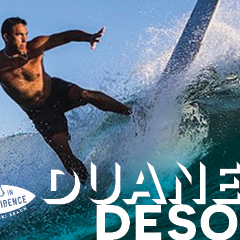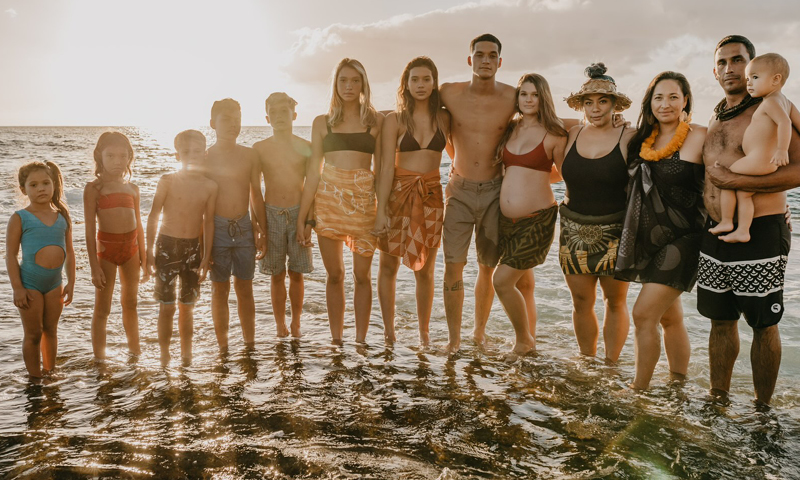言語を選択

サーファーズ・イン・レジデンス x デュアン・デソト
ハワイの文化について言えば、サーフィン界のレジェンド、デュアン・デソトは最も美しい信条のいくつかを実践しているだけではなく、それを次世代に広めることを使命としています。8人の子供の父親で、ドキュメンタリーシリーズの主役に抜擢されたウォーターマンの殿堂入りを果たしたデソトに、サーフィンそして人生についてタミー・モリスがインタビューしています。
サーフィンの国
デュアンは、グレッグ・ノルの有名な40のような世界最大の波があるマカハビーチで育ち、1969では50フィートのうねりに乗ることができます。そして、島では他に類を見ないサーフィンと文化の近所に育ちました。
「マカハは、ここハワイのさまざまな人々にとって非常に多くの異なる意味を持っています。西側であること...」とデュアンは言います。「私は、マカハから出てきた多くの素晴らしい水の人々や一般の人々に囲まれていました。お金があまりなかったかもしれませんが、お金以外の多くのものに恵まれていて、その恵みが世界を見つめ直し、物事を違った角度から評価する一因になるかもしれないと。
デュアンは、世代を超えて受け継がれてきた伝統の遺産から生じる土地(および水)に対する謙虚さと敬意を体現しています。そして、これは サーフィンそのもののように、彼の故郷であるマカハをはるかに超えて波紋を広げています。
「考えてみれば、それは深いことです。私たちの クプナ (先祖)から受け継いだスポーツを持つことは、突然、その楽しさと運動能力が全世界に波紋を広げ、私は8人の子供たちや孫と共有する素晴らしい機会を得ました。そして、それは驚くべきことです。」
ハワイ語で「責任」と大まかに訳される「 クレアナ」の意味について尋ねられると、デュアンの恩返しへの情熱が輝いています。
「私にとって、クレアナは、自分自身に提示され、私に受け継がれてきた責任を引き継ぐ特権です」と彼は語ります。
そして、それは彼の環境への愛情にもつながっています。
「サーファーであっても、環境に対するクレアナの視点は、ある意味で形成されました。それは、もっと学ぶべきこと、それを受け入れること、そして私たち人間がより良くなるべき膨大な方法を理解することでした」とデュアンは言います。「私たちのクプナは皆、私たちにそれを教えてくれました。私たちのクプナはその中で生きていました。ですから、持続可能性や言葉の言い回し、ハッシュタグ付けは、今やほとんどの先住民にとって普通だった伝統に戻るだけです」

海の子供たち
デュアンにとって、サーフィンの芸術と家族への愛は密接に関連しています。
「毎年、家族と過ごす最も大切な時間は、マカハで開催されるバッファロー・ビッグ・ボード・コンテストに家族が集まるときです」と彼は語ります。「それは私たち全員にとっての再会という自然な環境のようです...そして、それは私たちが住んでいるコミュニティ、その家族を表現しているようなものです。」
デュアンには5人の娘と3人の息子(そして孫)がおり、彼の家族への愛情は、すべてのケイキ(子供たち)を助けるという使命にまで及びます。妻、友人、親戚とともに、デュアンは2008年にNa Kama Kaiを設立しました。この非営利団体は、サーフィンを通じて次世代の環境への取り組みを育むのを支援し、デュアンが育ったコミュニティの精神を基盤に構築し続けています。
「(Nā Kama Kaiは)マカハの小さな宇宙であり、それを共有し、他の誰もがメンターとの交流、海、そして海、そして自分自身へのクレアナを持つためのアクセスを提供します。簡単に言えば、私たちは子供たちに教えます...教えない、さえ...私たちは若者に力を与えながら、彼らを海に送り込んでいます」とデュアンは言います。
彼はまた、ポリネシアンボヤージングソサエティの乗組員の一人であり、 ケイキに教育を提供し、彼らの海 とハワイの美しさへの愛情を育むために努力しています。
ウォーターマン!
彼が故郷と呼ぶ海への愛情と、彼が育ち、競技をしてきたスポーツへの情熱が、新しいドキュメンタリー「ウォーターマン」で 象徴的なデューク・カハナモク を演じるという彼の新しい役割につながったのです。
「彼は大きな足を持っているので、比喩的にも現実的にも、埋めるには大きな靴です」とデュアンは笑います。「このドキュメンタリーはポリネシア人によって監督されており、デュークが誰であったのか、そして彼が 1915 時代に何をしたのかを世界に見る機会を与えています。これは、海をはるかに超えて、時には言葉を間違って使用したり、乱用したりしますが、アロハにまで及ぶ証拠です。デュークはとても素晴らしい性格とスタイルを持っていて、出会ったすべての肌の色のすべての人に愛されていました。
デューク自身が乗っていたオールウッドのノーフィンボードのレプリカに乗るなど、デュークの時代のサーフィンを再現したシーンでデュアンが主演しています( アウトリガー・ワイキキ・ビーチ・リゾート に展示されている 、同じくサーファーズ・イン・レジデンスのPohaku Stoneが成形したオリジナルのボードのレプリカもご覧ください)。
「デュークやビーチボーイたちが乗っていたであろうボードに乗ることは、サーフィンについて私たちが知っていることすべてから一歩踏み出す機会だった」とデュアンは言う。「私にとって、マカハではあらゆる種類のボードに乗りますが、これは別のレベルのようなものです。そのボードに乗ると、それはとても大きくて重いので、ボードを感じるために自分自身を再プログラムする必要があります—そして、ボードに何をする必要があるか、そしてそれを波のどこに置く必要があるかを教えてもらいます。
デュアンの故郷であるオアフ島で、 クラフトホテル、ワイキキ・ビーチコマー(Waikiki Beachcomber )から のんびりとしたワイキキ・マリア by アウトリガー(Outrigger by Outrigger)など、オアフ島のお気に入りスポットに滞在して、映画をチェックアウトしてみてはいかがでしょうか。